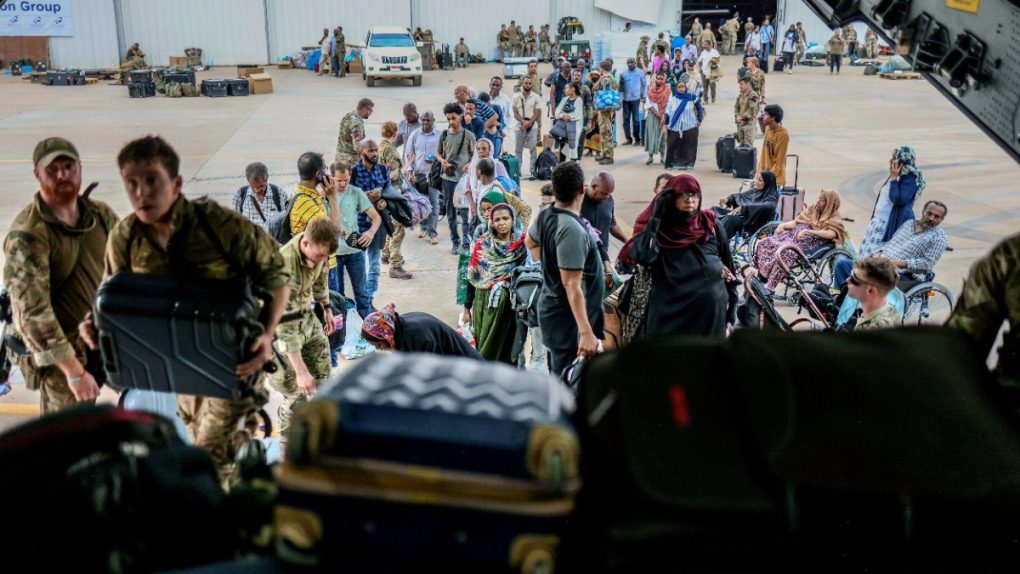Global Courant 2023-04-29 18:58:23
KHARTOUM, Sudan –
Gunfire and heavy artillery fire continued on Saturday in parts of the Sudanese capital of Khartoum, residents said, despite the extension of a ceasefire between the country’s two top generals, whose struggle for power has killed hundreds and thousands more. made their lives flee.
The civilian death toll rose to 411 on Saturday, according to the Sudan Doctors’ Syndicate, which monitors the victims. An additional 2,023 civilians have been injured in the fighting so far, the group added. In the city of Genena, the provincial capital of war-ravaged West Darfur, 89 people have been killed by intense violence. Fighters have moved into homes and taken over shops and hospitals while fighting in the streets, the syndicate said.
Khartoum, a city of some 5 million people, has turned into a frontline in the long-running conflict between General Abdel Fattah Burhan, the commander of the Sudanese army, and General Mohammed Hamdan Dagalo, who leads the powerful paramilitary group known as the Rapid Support Forces, which dashed the once euphoric hopes of Sudan’s democratic transition.
Foreign countries continued to evacuate diplomatic personnel and nationals, while thousands of Sudanese fled across the border into Chad and Egypt. Up to 20,000 refugees – mostly women and children – have crossed the western border into Chad, according to the United Nations, a country that has struggled for stability in the aftermath of its own coup two years ago.
Those who escape the fighting in Khartoum face more obstacles on their way to safety. The overland journey to Port Sudan, where ships then evacuate people via the Red Sea, has proved long and risky. Hatim el-Madani, a former journalist, said paramilitary fighters stopped refugees at roadblocks from the capital and demanded they surrender their phones and valuables.
“The RSF militia has an outlaw, bandit character,” he said, referring to the Rapid Support Forces. “It indicates that they have no supply line and that could get worse in the coming days.”
Airlifts from the country also posed a challenge, with a Turkish evacuation plane hit by gunfire outside Khartoum on Friday.
Despite a ceasefire that was extended for another 72 hours amid heavy international pressure, clashes continued around the presidential palace, the headquarters of the state broadcaster and a military base in Khartoum, residents said. The battles sent thick columns of black smoke rising over the city’s skyline.
In a few areas near the capital, including in Omdurman, residents reported some shops reopening as the scale of the fighting eased, with both sides attempting to observe a tenuous ceasefire. But in other areas, residents who sheltered at home as explosions thundered around them said fighters left home, frightened people and stole anything they could find.
Now in its third week, fighting has left large parts of Khartoum without electricity and running water. Those sheltering at home say their food and basic supplies are running low. Residents of the town of Omdurman, west of Khartoum, said on Saturday they had been waiting three days for fuel, complicating their escape plans.
UN aid coordinator, Martin Griffiths, said UN offices in Khartoum, as well as the Darfur towns of Genena and Nyala, had all been attacked and looted. “This is unacceptable – and prohibited under international law,” he said.
In the past 15 days of shelling each other, the generals have failed to deliver a decisive blow to each other in their battle for control of Africa’s third-largest nation. The army seemed to have the upper hand in the fighting, with its monopoly on air power, but it was impossible to confirm its claims of progress.
“Soon, the Sudanese state with its well-founded institutions will emerge victorious and attempts to hijack our country will be cut short forever,” the Sudanese military said on social media Saturdya.
Many hospitals in Khartoum and across the country are closed.
Few hoped that the conflict would soon end.
“Both sides are digging in,” says el-Madani, the former journalist. “This war can go on for a long time.”




